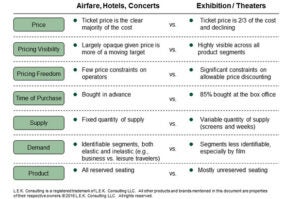Film exhibitors need a revenue boost, but so-called dynamic pricing is unlikely to give it to them
In our previous posts on the box office[1], we discussed many of the recent trends in the theatrical business. There are several challenges facing movie exhibitors in the U.S. and Canada, particularly the fact that the rate of admissions per person is declining about 3 percent per year.
And if Netflix and other home entertainment options continue to innovate and deliver ever-higher-quality content at attractive prices, cinema attendance will keep on struggling without further innovation (see our post on the Screening Room[2] for an example).
So…what should movie theaters do now to help themselves?
Also Read: Where Movie Studios Must Turn to Fix Their Failing Theatrical Fortunes (Guest Blog)[3]
Some have posited that cinemas should deploy dynamic pricing, similar to what airlines do when they sell seats. For example, cinemas could:
- Charge higher prices for holidays, opening weekends, key blockbusters, etc.
- Provide discounts for movies or weekends that are not pulling customers in
- Give discounts for unsold shows or inventory
- Increase prices for people who book tickets at the last minute
- Offer discounts for larger groups
While dynamic pricing may work for product categories such as airfare, hotels and concerts, it may offer less of an opportunity for movie exhibitors, given some industry-specific issues. Put another way, if revenue is a function of price and quantity, and cinemas can be as flexible as they want with the quantity, what else is there to gain by being flexible with the price?

Also Read: Why Movie Studios Need China to Build More Theaters (Guest Blog)[4]
For example, the cost structure is different. For movies, the ticket is a smaller portion of a consumer's total cost (after items like popcorn, parking, babysitters and so on are added in) compared to, say, concerts, where an attendee spends most of his or her money on the ticket.
The mechanics of the price itself are also different. With airline tickets, there is no single visible posted price (because each airline has many routes, many take-off times, many different travel periods during the year, etc.). This gives airlines some more flexibility, especially since they can largely price how they see fit. But with theaters, a clearly posted movie ticket price is very explicit, with little room for maneuvering, especially given the contracts that exhibitors have with the studios.
Purchasing behavior is different, as well. Nearly all travelers buy airline tickets well before they arrive at the airport. But consumers buy nearly nine out of every 10 movie tickets at the theater.
Also Read: Why 3D Is No Longer Hollywood Studios' Savior (Guest Blog)[5]
Supply provides another variable. Hotels can't create new rooms each day, but theaters have the flexibility to decide the number of screens on which movies play, even at the last minute.
And demand is different. Airlines have sales that drive new travel on certain routes. But there are few consumers who go see a film like the latest "Star Wars" blockbuster because there is a special ticket sale.
Finally, although some studios and cinemas offer reduced prices at certain times of the day, they will resist lowering sales even further with additional price cuts.
Also Read: How Studios Use Blockbuster Budgets to Boost Moviegoing Attendance (Guest Blog)[6]
There are, of course, arguments in favor of implementing dynamic pricing:
- Premium products (i.e., special reclining seats) are working, and premium pricing is a natural extension
- Reserved seating (a prerequisite for dynamic pricing) is happening gradually
- Some cinema operators are reducing seats per screen, which should make reserved seating even more relevant
- Exhibitors are getting more creative and efficient with their loyalty programs, which should improve market segmentation opportunities
- Raising prices for holiday weekends or, for example, for Friday nights at 7:30 p.m. will probably work (these have been tested in L.E.K. Consulting research)
However, as discussed above, there are probably more reasons against dynamic pricing than there are arguments in favor of it.
Thus, dynamic pricing will likely struggle. While some price-up opportunities will work (like raising the cost of tickets on holidays or opening weekends), these will make going to the movies even more expensive relative to other options such as Netflix and Hulu.
Also Read: Why Theaters and the Moviegoing Experience Need an Overhaul (Guest Blog)[7]
As we wrote in one of our prior posts[8], the cost of going to the movies has been escalating, while the price that consumers pay for in-home entertainment has declined. Thus, while dynamic price-ups might drive short-term cash flow for cinemas and studios, those increases will only exacerbate the 3 percent per year audience decline.
In summary, while dynamic pricing offers theaters some pockets of opportunity, the film-exhibition industry may not yet be at a stage where it can expect such changes to cause a significant uptick in value.
In our next post, we will cover a much more promising idea, subscriptions.
This is Part 6 in a series by Dan Schechter, head of L.E.K. Consulting's Media, Entertainment & Technology consulting practice, with additional contributions by John Calkins, former Warner Bros., Sony Pictures and AMC Theatres executive.[9][10][11]
References
- ^ our previous posts on the box office (www.thewrap.com)
- ^ post on the Screening Room (www.thewrap.com)
- ^ Where Movie Studios Must Turn to Fix Their Failing Theatrical Fortunes (Gue st Blog) (www.thewrap.com)
- ^ Why Movie Studios Need China to Build More Theaters (Guest Blog) (www.thewrap.com)
- ^ Why 3D Is No Longer Hollywood Studios' Savior (Guest Blog) (www.thewrap.com)
- ^ How Studios Use Blockbuster Budgets to Boost Moviegoing Attendance (Guest Blog) (www.thewrap.com)
- ^ Why Theaters and the Moviegoing Experience Need an Overhaul (Guest Blog) (www.thewrap.com)
- ^ we wrote in one of our prior posts (www.thewrap.com)
- ^ Dan Schechter (www.lek.com)
- ^ L.E.K. Consulting's Media, Entertainment & Technology consulting practice (www.lek.com)
- ^ John Calkins (www.linkedin.com)




